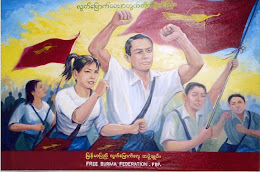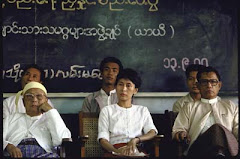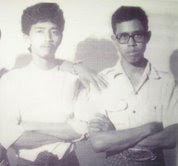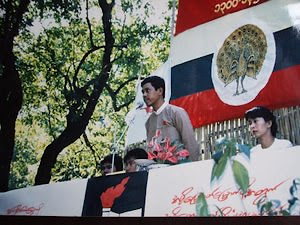အာရွ က ငါ တိုု ့မပါပဲ ခ်ီ တက္ ေနတယ္။ (မက္ကိန္း )
Another major test for U.S. diplomacy is Burma. I have traveled to Burma twice over the past year. And to be sure, they still have a long way to go, especially in stopping the violence and pursuing genuine reconciliation with the country’s ethnic minorities. But the Burmese president and his allies in the government, I believe, are sincere about reform. And they are making real progress.
For the past year I have said that concrete actions by Burma’s government toward democratic and economic reform should be met with reciprocal actions by the United States that can strengthen these reforms, benefit ordinary Burmese and improve our relationship. Following the recent election that brought Aung San Suu Kyi and the National League for Democracy into the parliament, I think now is the time to suspend U.S. sanctions, especially – except for the arms embargo, and targeted measures we maintain against individuals and entities in Burma that undermine democracy, violate human rights and plunder the nation’s resources. This would not be a lifting of sanctions, just a suspension. And this step, as well as any additional easing of sanctions, would depend on continued progress and reform in Burma.
We must also establish a principled, and ideally, binding, standards of corporate social responsibility for U.S. business activities in Burma. Aung San Suu Kyi has made the distinction between the right and wrong kinds of investment. The right kind of investment would strengthen Burma’s private sector, benefit its citizens and ultimately loosen the military’s control over the economy and the civilian government. The wrong investment would do the opposite, entrenching a new oligarchy and setting back Burma’s development for decades.
For this reason, I am not convinced that American companies should be permitted to do business at this time with state-owned firms in Burma that are still dominated by the military. U.S. business will never win a race to the bottom with some of their Asian or even European competitors, and they should not try. Rather, they should align themselves with Aung San Suu Kyi and the Burmese people, who want the kinds of responsible investment, high labor and environmental standards and support for human rights and national sovereignty that define American business at its best.
Our goal should be to set the global standard for corporate social responsibility in Burma, a standard that we, as well as Aung San Suu Kyi, could use to pressure others to follow our lead. And that could become the basis for new Burmese laws.
Another major test for U.S. diplomacy is Burma. I have traveled to Burma twice over the past year. And to be sure, they still have a long way to go, especially in stopping the violence and pursuing genuine reconciliation with the country’s ethnic minorities. But the Burmese president and his allies in the government, I believe, are sincere about reform. And they are making real progress.
For the past year I have said that concrete actions by Burma’s government toward democratic and economic reform should be met with reciprocal actions by the United States that can strengthen these reforms, benefit ordinary Burmese and improve our relationship. Following the recent election that brought Aung San Suu Kyi and the National League for Democracy into the parliament, I think now is the time to suspend U.S. sanctions, especially – except for the arms embargo, and targeted measures we maintain against individuals and entities in Burma that undermine democracy, violate human rights and plunder the nation’s resources. This would not be a lifting of sanctions, just a suspension. And this step, as well as any additional easing of sanctions, would depend on continued progress and reform in Burma.
We must also establish a principled, and ideally, binding, standards of corporate social responsibility for U.S. business activities in Burma. Aung San Suu Kyi has made the distinction between the right and wrong kinds of investment. The right kind of investment would strengthen Burma’s private sector, benefit its citizens and ultimately loosen the military’s control over the economy and the civilian government. The wrong investment would do the opposite, entrenching a new oligarchy and setting back Burma’s development for decades.
For this reason, I am not convinced that American companies should be permitted to do business at this time with state-owned firms in Burma that are still dominated by the military. U.S. business will never win a race to the bottom with some of their Asian or even European competitors, and they should not try. Rather, they should align themselves with Aung San Suu Kyi and the Burmese people, who want the kinds of responsible investment, high labor and environmental standards and support for human rights and national sovereignty that define American business at its best.
Our goal should be to set the global standard for corporate social responsibility in Burma, a standard that we, as well as Aung San Suu Kyi, could use to pressure others to follow our lead. And that could become the basis for new Burmese laws.










































No comments :
Post a Comment